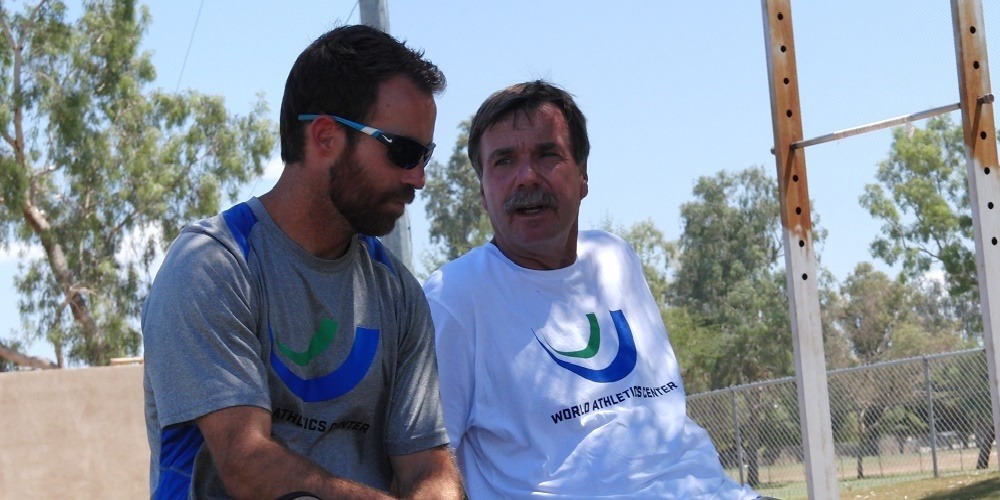Following the resounding success of the October ACP in partnership with EXOS, November’s ACP followed swiftly on with a high standard to follow.
It didn’t disappoint. Apprentice Coaches saw guest lecturers Brett Bartholomew (EXOS), Andy O’Brien (Hockey S&C Coach who works with Sydney Crosby, among others), Buddy Morris (Head Coach of Physical Preparation with the Arizona Cardinals), and Dr Jeremy Koenig (Sports Geneticist at Athletigen). Presentations were followed by the acclaimed poolside chat; a coaching education opportunity unparalleled in its level of organic interaction and real-world relevance. But don’t just take our word for it – this is what some of our ACP guests had to say on the week:
“Been in this business 30 plus years – after 1 day with Dan Pfaff, Stu McMillan and the Altis coaches & athletes I can say this is the best learning experience I’ve had.” Lorne Goldberg
“Any coaches, strength coaches & therapists looking for learning opportunities, Altis would be my first recommendation.” Andy O’Brien
“The opportunity to observe & interact with Dan Pfaff has been one of the highlights of my professional career.” Gareth Tong
In the spirit of honoring our commitment to Coach Education; for those of you that were unable to join us, or did not follow along on our Twitter feed, we are instead pleased to offer you the opportunity to peruse the highlights of this great 7 day event in the summary below.
Monday 3rd Nov
Creativity is valuable in coaching, but the ability to have and understand perspective is critical @PfaffSC
What would happen if you asked a 200m sprinter to total 10k worth of runs per week? Not many athletes would sign up for that @PfaffSC
Find volumes that make sense for each athlete’s sport/ training status @bodybyobrien 10,000 laps may not apply
Be weary of getting too far away from your plan A – mind the performance gap .. exercises must transfer @PfaffSC
Generally, the most talented athletes spend less time on exercises/items that don’t matter. @StuartMcMillan1
How do poor mechanics (I.e. forefoot strike in warm up) impact joint hydraulics and function? Be mindful of purposeful mechanics @PfaffSC
As coaches, we must prove ourselves to our athletes daily. We cannot rest on past success, must be humble and curious @PfaffSC
What else-where else. What is the source of dysfunction? Treating symptoms is like chasing wind @PfaffSC
If the exercise is written down on paper, there should be an ideal model to work toward – @PfaffSC
Tuesday November 4th
Science seeks answers, training seeks results. Coaches are often years ahead of science out of necessity @PfaffSC
The more I monitor with tech, the more confused I get. When is data too much? Do we rely too much on data? Buddy Morris
With @donovanbailey in 96, we had contingency plan. This was primary reason for medal amidst distraction @PfaffSC
There is a work/rest ratio tipping point based on age/experience – less volume can often improve performance @PfaffSC
Focus on opportunity versus pressure – positive focus often wins – perspective is critical @bodybyobrien
Navy seals repelling walls at midnight is competency training … Sport coaches should focus on specific competencies @PfaffSC
Clear the clutter from your mind, and it’s amazing what can be accomplished – Buddy Morris
Mental resilience is not about duration of physical abuse – true resilience is not boot camp @bodybyobrien
Work is like a drug for coach/athlete – early it’s beneficial, but too much is very counterproductive
Dan Pfaff
@LorneGoldenberg discusses the Captain Kirk principle – coaches innately know when to push athletes – when to stop.
Coach @GTongy – technology often tells us what we already know- if athletes are chatty they are often ready!
Buddy Morris’ presentation:
If the system is dogmatic- it won’t change. Great coaches learn to navigate and be effective
Train special and general work capacity, focus on technical mastery
Why do I like tempo work? IT allows the athletes to relax and focus on movement quality
Keep it simple – how many aspects of performance do you correct daily?
The American dinner plate has increased in size by 25% – less is more
How much are you paying attention to residual effects throughout the duration of a season?
Game situations involves high emotional responses – do not underestimate the effect on the body
The athlete’s body does not lie – must listen to the athlete. Do not lean on your own understanding
The key to performance on field, depends on what we do off the field- promote recovery for optimal performance
The best program in the world is the one you are not doing – there is no magical program
No 1 system of the body works individually – all are connected
We are innate problem solvers – in sport our job is to solve motor tasks
What works for one, does not always work for another. Coaches must find what works best for the athlete.
I have a system, not a philosophy. Philosophy is for philosophers.
Buddy Morris
Wednesday 5th
“Find out what motivates your athletes. Sometimes compromise is necessary” @GTongy
You can’t win a logical argument against an emotional bias … emotion will win every time” @SMcMillan1
Who’s in your network – mine includes about 5 cognitive behaviour specialists. It’s ok to seek outside help @PfaffSC
“SO important to understand what the athletes has gone through in his/her life” @CoachSanAndreas
There’s a magic in planting seeds within the athlete – let them think it’s their idea: better buy-in! Andreas Behm
“This is the best discussion around strength and conditioning I’ve ever been involved in” @Coach_BrettB
You can’t separate life from sport completely. May miss opportunity to make big impact in athlete’s life @KyleHierholzer
“Remind yourself daily of why you coach – helps to be patient and delay reaction” @dtmack
“The coach-athlete relationship HAS to be hierarchical … we are not here to be their friends”
Stu McMillan”
We take our recruitment policy seriously … the right athletes drive our positive culture – @CoachSanAndreas
Quarterbacks tend to be learners, military tend to be defenders- mind unique character qualities @Coach_BrettB
Sometimes our job is about asking the right questions- not having the right answers @Coach_BrettB
Biggest learning curve for me was learning about layers of individual athlete drivers @PfaffSC @Coach_BrettB
Fear can paralyze and confine – how do we help re-frame athlete fears so they can cope? @Coach_BrettB
Culture has a ripple effect on character – are you a teacher that sets expectations or a caterer? @Coach_BrettB
Some gyms are purposeful- create the mix of grit, need, and talent for success @Coach_BrettB
It’s powerful if it’s first personal – how does environment influence personal connection to work? Brett Bartholomew
Do we really understand drivers and what influences each athlete’s reason for competing? @Coach_BrettB
How many coaches notice the way you coach versus what exercises you choose @Coach_BrettB
Great coaches will always have a place as long as they are willing to stay in the trenches @Coach_BrettB
Too many painters in our industry – not enough artists @Coach_BrettB
Thursday 6th
Read any interview with any Olympian over 33yrs old – first thing they say is “I changed how I trained ” @PfaffSC
Work-life balance is a myth… For the true master work/life separation is often difficult. @StuartMcMillan1
When I finally figured out less is more, I learned how to manage my personal work habits @PfaffSC
Coaches @dtmack & @piercefjonathan – surroundings, training partners, team chemistry cannot be overlooked
Essence of sport is not always performance- emphasize camaraderie, life lessons, joy of competition @bodybyobrien
Layer your principles in exercise selection … have multiple justifications for each exercise @bodybyobrien
“Identify limiting factors – this is the gateway to high performance”
Andy O’Brien
“Quality of athletes’ life more important than athlete performance” @bodybyobrien
Players that have great motor skills and adaptability tend to be better playmakers-aka “slippery” @bodybyobrien
Vertical movement is limiting factor for accel in hockey – vertical jump v broad jump considerations @bodybyobrien
Lateral single leg loading- base of support is crucial – absolute SL strength a factor?? @bodybyobrien
Always start evaluation with conversation – athletes often know their own limiting factors best @bodybyobrien
“ACCURATELY define the task … what do high performers do differently?” @bodybyobrien
“Quantify the subtleties of performance, and work backwards from there” @bodybyobrien
It has been my experience that there are many non-specific factors that improve performance @bodybyobrien
Many unique challenges in dynamic sport- I.e. Hockey is a quite asymmetrical sport. @bodybyobrien
Which technique is “correct”? – does it depend on the desired outcome and athlete classification? @bodybyobrien
here are a variety of ways we come into knowledge – great coaches use all methods of epistemology @bodybyobrien
My learning experiences- 1. Producing results under pressure 2. Adapting programming across sports @bodybyobrien
Friday 7th
<0.5% of variation in our genome accounts for all the diversity we see between people @KoeniGator
Huge decrease in auto-immune disorders the closer you are to the equator – @KoeniGator
Main message from @DavidEpstein’s ‘The Sports Gene’: performance = training + genetics @KoeniGator
“This is not genetic determinism – it is genetic relativism … more information = better decisions” Jeremy Koenig
I’ve been doing this for 43 years – and the questions always seem to be similar – even in diverse groups @PfaffSC
“Add value – build context” @PfaffSC
“You don’t have to be perfect to be fast” @StuartMcMillan1
“Perfectionism is a nasty, nasty virus” @PfaffSC
We can’t be everything for everybody- it takes a certain type of person to come out @PfaffSC
What is your genetic propensity to train? Potential for power? Recovery? Injury prev. @KoeniGator @athletigen
It is time to start considering things we cannot see on the surface – get rid of the genetic divide @KoeniGator
Both genetic and environmental factors contribute to susceptibility – interdependent factors @KoeniGator
Eventually I got sick and tired of working with people who were sick and tired – moved to sports @KoeniGator
Passion for evolution and genetics has fuelled my perspective on performance @KoeniGator
If this has left you with a thirst for more, you too can interact with our great coaches and speakers through the upcoming programs:
December 4-7 a weekend ACP that runs concurrently with our first ever Performance Therapy Program. If you are a coach who is interested in therapy, this one is for you! The Performance Therapy program is sold out, but there are still a few slots left for the ACP.
January 12-16 a week-long program, with guest-coaches still to be determined.
February 12-15 an ACP program in conjunction with our Performance Therapy Program.
March 9-15 we are looking at once again partnering with EXOS for this event.
April 9-12 another ACP in conjunction with our Performance Therapy Program.
To register your interest in any of these courses, please leave your details here. Our Team will get back to you shortly.

